NYU recently partnered with Brooklyn-based tech startup Qunnect to establish a secure communication network for transmitting data between the company’s headquarters and the university’s Washington Square campus.
The university is calling the announcement a “technical milestone” that will expand underground communication networks in the city. Quantum technology uses non-traditional values to ensure that data cannot be intercepted by hackers. This technology can be used to provide more secure communication for financial and banking centers in the city.
“When we do research experiments, we use the best of everything,” Qunnect CEO Noel Goddard said. “When we wanted to do the experiment with NYU, we intentionally set up something that was a more sort of real world example with a lower cost detector.”
Javad Shabani, director of NYU’s Center for Quantum Information Physics, said earlier versions of quantum networks were only fully functional for brief periods of time.
“Having a testbed is kind of the platform for shooting off a lot of new directions,” Shabani said. “The students are loving it. We have multiple undergrads and grad students in the lab that are trying to find what we are doing and how you can improve it.”
Stacie Bloom, NYU’s vice provost for research, shared that the university also received $7.5 million in federal funding from the U.S. Department of Defense to allow NYU’s CQIP to continue advancing the technology.
To expand professional opportunities in quantum research, NYU recently collaborated with IBM to establish paid internship opportunities in quantum physics for undergraduate and graduate students.
Shabani said the university also hopes to continue research into the field on campus. Several undergraduate students are currently completing quantum research at CQIP and contributed to the creation of the network.
“If AI is the future, then quantum is the next future,” Shabani said. “We are waiting for the breakthroughs to make sure that the rest is all about throwing money and manpower into it.
Contact Alyona Uvarova at [email protected].


























































































































































